New titles arrive at the Robert L. Bogomolny Library at The University of Baltimore every week! Below is a small sampling of what has come in during the Spring semester. Check a title out for some early Summer reading and explore new topics or relax with some leisure reading in the shade.
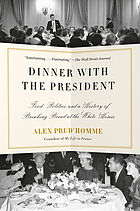
Dinner with the president (2023) by Alex Prud’homme
“A powerful reflection on the universal art museum, considering the values critical to its history and anticipating its evolving place in our cultural future. Art museums have played a vital role in our culture, drawing on Enlightenment ideals in shaping ideas, advancing learning, fostering community, and providing spaces of beauty and permanence. In this thoughtful and often personal volume, Daniel H. Weiss contemplates the idea of the universal art museum alongside broad considerations about the role of art in society and what defines a cultural experience. The future of art museums is far from secure, and Weiss reflects on many of the difficulties these institutions face, from their financial health to their collecting practices to the audiences they engage to ensuring freedom of expression on the part of artists and curators. In grappling with these challenges, Weiss sees a solution in shared governance. His tone is one of optimism as he looks to a future where the museum will serve a greater public while continuing to be a steward of culture and a place of discovery, discourse, inspiration, and pleasure. This poignant questioning and affirmation of the museum explores our enduring values while embracing the need for change in a rapidly evolving world.”
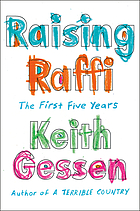
Raising Raffi (2022) by Keith Gessen
“An unsparing, loving account of fatherhood and the surprising, magical, and maddening first five years of a son’s life “I was not prepared to be a father-this much I knew.” Keith Gessen was nearing forty and hadn’t given much thought to the idea of being a father. He assumed he would have kids, but couldn’t imagine what it would be like to be a parent, or what kind of parent he would be. Then, one Tuesday night in early June, the distant idea of fatherhood came careening into view: Raffi was born, a child as real and complex and demanding of his parents’ energy as he was singularly magical. Fatherhood is another country: a place where the old concerns are swept away, where the ordering of time is reconstituted, where days unfold according to a child’s needs. Whatever rulebooks once existed for this sort of thing seem irrelevant or outdated. Overnight, Gessen’s perception of his neighborhood changes: suddenly there are flocks of other parents and babies, playgrounds, and schools that span entire blocks. Raffi is enchanting, as well as terrifying, and like all parents, Gessen wants to do what is best for his child. But he has no idea what that is. Written over the first five years of Raffi’s life, Raising Raffi examines the profound, overwhelming, often maddening experience of being a dad. Gessen traces how the practical decisions one must make each day intersect with some of the weightiest concerns of our age: What does it mean to choose a school in a segregated city? How do you instill in your child a sense of his heritage without passing on that history’s darker sides? Is parental anger normal, possibly useful, or is it inevitably authoritarian and destructive? How do you get your kid to play sports? And what do you do, in a pandemic, when the whole world seems to fall apart? By turns hilarious and poignant, Raising Raffi is a story of what it means to invent the world anew”
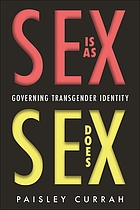
Sex is as sex does (ebook, 2022) by Paisley Currah
“What the evolving fight for transgender rights reveals about government power, regulations, and the law Every government agency in the United States, from Homeland Security to your state’s Department of Motor Vehicles to your local elementary school, has the authority to make its own rules for sex classification. Many transgender people find themselves in the bizarre situation of having different sex classifications on different documents. Whether you can change your legal sex to “F” or “M” (or more recently “X”) depends on what state you live in, what jurisdiction you were born in, and what government agency you’re dealing with. In Sex Is as Sex Does, noted transgender advocate and scholar Paisley Currah explores this deeply flawed system, showing why it fails transgender and non-binary people. Providing examples from different states, government agencies, and court cases, Currah explains how transgender people struggle to navigate this confusing and contradictory web of legal rules, definitions, and classifications. Unlike most gender scholars, who are concerned with what the concepts of sex and gender really mean, Currah is more interested in what the category of “sex” does for governments. What does “sex” do on our driver’s licenses, in how we play sports, in how we access health care, or in the bathroom we use? Why do prisons have very different rules than social service agencies? Why is there such resistance to people changing their sex designation? Or to dropping it from identity documents altogether? In this thought-provoking and original volume, Sex Is as Sex Does reveals the hidden logics that have governed sex classification policies in the United States and shows what the regulation of transgender identity can tell us about society’s approach to sex and gender writ large. Ultimately, Currah demonstrates that, because the difficulties transgender people face are not just the result of transphobia but also stem from larger injustices, an identity-based transgender rights movement will not, by itself, be up to the task of resolving them.”
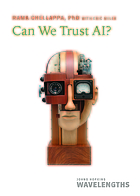
Can we trust AI? (2022) by Rama Chellappa and Eric Niiler
“Artificial intelligence is part of our daily lives. How can we address its limitations and guide its use for the benefit of communities worldwide? Artificial intelligence (AI) has evolved from an experimental computer algorithm used by academic researchers to a commercially reliable method of sifting through large sets of data that detect patterns not readily apparent through more rudimentary search tools. As a result, AI-based programs are helping doctors make more informed decisions about patient care, city planners align roads and highways to reduce traffic congestion with better efficiency, and merchants scan financial transactions to quickly flag suspicious purchases. But as AI applications grow, concerns have increased, too, including worries about applications that amplify existing biases in business practices and about the safety of self-driving vehicles. In Can We Trust AI?, Dr. Rama Chellappa, a researcher and innovator with 40 years in the field, recounts the evolution of AI, its current uses, and how it will drive industries and shape lives in the future. Leading AI researchers, thought leaders, and entrepreneurs contribute their expertise as well on how AI works, what we can expect from it, and how it can be harnessed to make our lives not only safer and more convenient but also more equitable. Can We Trust AI? is essential reading for anyone who wants to understand the potential-and pitfalls-of artificial intelligence. The book features: an exploration of AI’s origins during the post-World War II era through the computer revolution of the 1960s and 1970s, and its explosion among technology firms since 2012; highlights of innovative ways that AI can diagnose medical conditions more quickly and accurately; explanations of how the combination of AI and robotics is changing how we drive; and interviews with leading AI researchers who are pushing the boundaries of AI for the world’s benefit and working to make its applications safer and more just.”
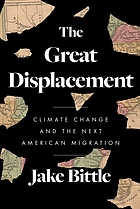
The great displacement (2023) by Jake Bittle
“The untold story of climate migration-the personal stories of those experiencing displacement, the portraits of communities being torn apart by disaster, and the implications for all of us as we confront a changing future”– Provided by publisher. We think about the dangers of climate change in the future tense: that as global warming gets worse over the coming decades, millions of people will scatter around the world fleeing famine and rising seas. What we often don’t realize is that the consequences of climate change are already visible, right here in the United States. Bittle shows that, from fire-scorched California to the soaked watersheds of inland North Carolina, people are moving. Insurance and mortgage markets are already shifting to reflect mounting climate risk, pricing people out of risky areas. He tells the stories of those already experiencing life on the move, and show how radically climate change will transform our lives– and reshape the geography of the United States.”
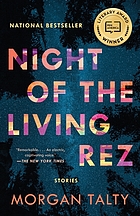
Night of the living rez (2022) by Morgan Talty
“Set in a Native community in Maine, Night of the Living Rez is a riveting debut collection about what it means to be Penobscot in the twenty-first century and what it means to live, to survive, and to persevere after tragedy. In twelve striking, luminescent stories, author Morgan Talty–with searing humor, abiding compassion, and deep insight–breathes life into tales of family and a community as they struggle with a painful past and an uncertain future. A boy unearths a jar that holds an old curse, which sets into motion his family’s unraveling; a man, while trying to swindle some pot from a dealer, discovers a friend passed out in the woods, his hair frozen into the snow; a grandmother suffering from Alzheimer’s projects the past onto her grandson; and two friends, inspired by Antiques Roadshow, attempt to rob the tribal museum for valuable root clubs. A collection that examines the consequences and merits of inheritance, Night of the Living Rez is an unforgettable portrayal of an Indigenous community and marks the arrival of a standout talent in contemporary fiction.”
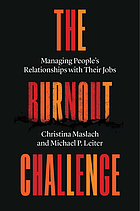
The burnout challenge (ebook, 2022) by Christina Maslach and Michael P Leiter
“Burnout is among the most significant on-the-job hazards facing workers today. It is also among the most misunderstood. In particular, we tend to characterize burnout as a personal issue–a problem employees should fix themselves by getting therapy, practicing relaxation techniques, or changing jobs. Christina Maslach and Michael P. Leiter show why this is not the case. Burnout also needs to be managed by the workplace. Citing a wealth of research data and drawing on illustrative anecdotes, The Burnout Challenge shows how organizations can change to promote sustainable productivity. Maslach and Leiter provide useful tools for identifying the signs of employee burnout, most often exhaustion, cynicism, and ineffectiveness. They also advise managers on assembling and interpreting worker self-evaluation surveys, which can reveal workplace problems and potential solutions. And when it comes to implementing change, Maslach and Leiter offer practical, evidence-driven guidance. The key, they argue, is to begin with less-taxing changes that employees nonetheless find meaningful, seeding the ground for more thorough reforms in the future.”
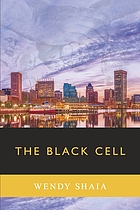
The black cell (2022) by Wendy Shaia
“It’s 2024, and police brutality against Black people is at an all-time high in Baltimore and across the country. Corey Masters, a young Black man, is deeply troubled by experiences of racism during his childhood. After a false arrest and beating by police, Corey’s anger is at boiling point. It is then that his roommate introduces him to the Baltimore Cell, one of many secret groups around the country recruiting and training Black people for armed resistance. Corey joins the Cell and meets Tasia, a young single mother who is trying to find a place in the world for herself and her toddler daughter. Both Corey and Tasia become involved in the Cell’s armed resistance against white supremacy. The US is on the verge of electing a new president who will bring to power a group called The Alt, which is determined to return Black people to slavery. The Cell joins with La Lucha (its Latinx counterpart), which is organizing armed resistance to protect Latinx residents and immigrants. Together, the two groups maintain a growing membership in the millions. The Black Cell is a Black dystopian fantasy, grounded in the author’s experience as a Baltimore antiracist advocate, professor, and social service leader. Unapologetically targeted to Black listeners and others interested in Black liberation, this will appeal to fans of utopian fantasies.”